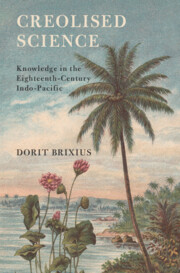Book contents
- Creolised Science
- Science in History
- Creolised Science
- Copyright page
- Dedication
- Contents
- Figures
- Acknowledgements
- Author’s Note
- Abbreviations
- Introduction
- 1 The Limits of French Colonial Visions and Science
- 2 The Acquisition of Knowledge and Plants, from Madagascar to China
- 3 Agriculture and Everyday Knowledge
- 4 Enslaved People as Knowledge Carriers
- 5 The Cross-Cultural Quest for Spices in South East Asia
- 6 Materials, Environment, and the Application of Knowledge
- Conclusion
- Bibliography
- Index
3 - Agriculture and Everyday Knowledge
Published online by Cambridge University Press: 03 April 2024
- Creolised Science
- Science in History
- Creolised Science
- Copyright page
- Dedication
- Contents
- Figures
- Acknowledgements
- Author’s Note
- Abbreviations
- Introduction
- 1 The Limits of French Colonial Visions and Science
- 2 The Acquisition of Knowledge and Plants, from Madagascar to China
- 3 Agriculture and Everyday Knowledge
- 4 Enslaved People as Knowledge Carriers
- 5 The Cross-Cultural Quest for Spices in South East Asia
- 6 Materials, Environment, and the Application of Knowledge
- Conclusion
- Bibliography
- Index
Summary
Featuring an explanation of Enlightenment thought on agronomy and political economy, Chapter 3 examines the efforts to make Mauritius a self-sufficient island through the importation and naturalisation of plants (primarily foodstuffs and fodder, also some industrial materials, and a few ornamental plants). It explores how newly introduced and ‘old’ plants were cultivated and how local knowledge, which was gathered together with the plants in their countries of origin, was implemented. It highlights the practical significance of knowledge about plants in relation to their cultivation of Malagasy and non-European communities across Asia. It seeks to understand how settlers sought to cultivate foreign, newly introduced staple crops, such as rice, root vegetables, and fruit trees. Stressing the importance of non-European knowledge, the chapter looks at the interplay of this knowledge between its practical implementation and environmental factors. The chapter reveals that cultivation techniques were difficult to implement and often led to a crop’s failure.
Keywords
- Type
- Chapter
- Information
- Creolised ScienceKnowledge in the Eighteenth-Century Indo-Pacific, pp. 80 - 117Publisher: Cambridge University PressPrint publication year: 2024



